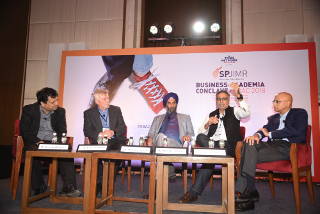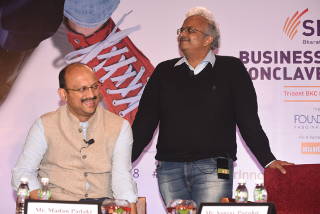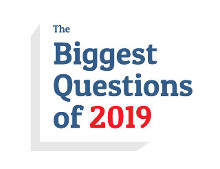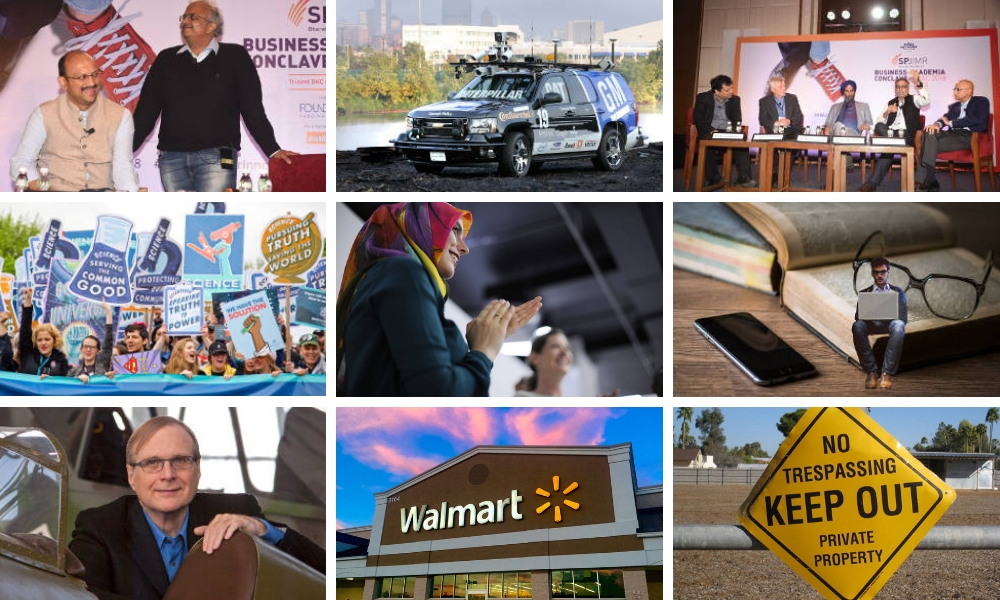Dear friend,
It is that time of the year when people start to introspect and plan ahead. At Founding Fuel we pored over our archives from 2018 to select enduring narratives.
Our mandate is clear. Stay relevant to those in entrepreneurial roles. For us, anybody who seizes initiative and demonstrates exemplary leadership is an entrepreneur. They may be in government, business, the social sector, or wedded to a personal cause.
Anybody who seizes initiative and demonstrates exemplary leadership is an entrepreneur
First, each of us on the team made a list of our own Top 10. We then explained to the others why the selection makes the cut, with the listeners playing Devil’s Advocate over multiple conference calls. After hours of debate, it was pretty clear that some common narratives held the long list together.
Engagement over eyeballs
Everybody agreed what Haresh Chawla thought of Walmart’s decision to pay $16 billion to acquire a 77% stake in Flipkart is classical “Founding Fuel material”. It combines clarity of thought with solid content and has a great narrative. These, incidentally, are filters we use for our stories.
Haresh wrote this story overnight. He pointed to the Battles in the Age of Engagement. “It contains a framework to think through how technology companies must be looked at. How deeply can an entity permeate the lives of those who have signed up, is the question we must ask,” he offered.
On another note, Haresh was part of a panel curated by Founding Fuel that discussed why large corporations must partner with start-ups to foster innovation. But how do they engage? Watch this segment of the discussion on whether “employees” is an outdated idea, or whether that kind of thought can lead to chaos.
Theorists are, well theorists
It is completely coincidental that this conversation was hosted at a B-School. Because Harsh Vardhan, a strategy consultant and visiting faculty at various B-Schools, has vociferously argued B-schools in India have killed research. Indrajit Gupta doesn’t think much of them either and called the bluff on the b-school placement bull s*&^.
After having co-authored a book on Project Aadhaar, I see the point. I often get this question from those in academia: “How large was your sample size?” I explain to them that quantitative and qualitative analysis are two very different things. The rot, we think, lies in that most B-Schools have degenerated into placement agencies.
This shows up in the management talent pool India now has. What was originally intended to be a humane practice, has been dehumanized. There is much work that needs to be done to undo decades of damage.
Purpose trumps failure
If talent be so scarce, who will go to first principles and ask fundamental questions such as what is the purpose of an enterprise?
If purpose is defined, greatness is inevitable
What do those at the helms of different firms think of this question and what may it take to transform the soul of an enterprise? To find out, we curated an all-star panel. An outstanding conversation followed. There are many successful firms. But very few make the cut as great firms. Why? Back to first principles. If purpose is defined, greatness is inevitable.
All of us who were witnesses to the conversation on stage that day were particularly enamoured by Rahul Narayan of Team Indus. He had just lost out on the X-Prize. But did not look distressed.
N Dayasindhu wasn’t either. He thought their missing a deadline is a blip. Those who work on projects such as these eventually figure they are at work on not just deploying technology, but systems—all outcomes cannot be predicted.
All outcomes lie on a spectrum
Talking of outcomes, early in February 2018, buoyed by the Indian cricket team’s winning streak in South Africa, Indrajit thought it apt to explain how teams can be built to succeed in the long run.
Yet, after the South African tour, Kohli’s team ran into heavy weather in England. And almost on cue, tongues started to wag about Kohli’s flaws as a captain. Indrajit analysed what had perhaps gone wrong in his column What Virat Must Do in Business Standard.
CEOs are trained to shut the noise out and stay focused on the task at hand
It is inevitable you will fail at times. Times like these, good captains don’t change the team composition constantly. Trigger-happy and aggressive CEOs do this routinely though when performance lags investor expectations. Modern cricketers and CEOs are trained to shut the noise out and stay focused on the task at hand. Kohli is still learning the ropes.
Even before the final deal structure was announced, Indrajit was quick off the block to place six reasons why suitors will line up to buy Air India. We now know there were no takers because of a series of onerous terms that literally killed the deal. Perspective was offered by a high-ranking bureaucrat. “What you must understand is there are those in the system with negative power and will say no because they can.”
Different people, different strokes
That is why when Microsoft co-founder Paul Allen died, I felt compelled to jot my thoughts down about the two kinds of people around us—dreamers like Paul Allen and entrepreneurs like Bill Gates. Both create. But often, the dreamer may stop short while the entrepreneur may steam roll opposition. Friction between them is inevitable.
That is why NS Ramnath and I find the battlefield that is Project Aadhaar interesting. Some are building an ecosystem around it; others understand it well, but think it is evil and must be abandoned. The spat got ugly until the Supreme Court was asked to step in. Its verdict leaves more questions than answers.
Ramnath stepped in to write The Curious Case of Section 57. Thanks to that, we now know, the bench listening to the case hadn’t wrapped its head around the significance of what they were ruling on.
Meanwhile, the sniping between both camps continues. Much of it has been documented in our book “The Aadhaar Effect” and all of what is going on is being tracked on https://aadhaar.foundingfuel.com/
Platforms and Movements
The curious thing about people and technology is that when they get together, while many can often be antagonistic, others choose to embrace it. Is it possible to create a platform that increases access to education for millions of kids, or trains young people in rural areas to turn entrepreneurs? The question is one that Madan Padaki of 1Bridge and Sanjay Purohit at EkStep Foundation have often asked.
They engaged in a public conversation around the idea of societal platforms. It is an intriguing idea, and promises to push boundaries.
When boundaries are pushed, walls that have stood forever can fall too
But when boundaries are pushed, walls that have stood forever can fall too. That may explain the #metoo movement in India.
Indrajit took the Tata group to task for attempting to brush aside allegations of sexual misconduct against Rakesh Sarna. That was soon after K Ramkumar posited it isn’t enough to have rules in place. There is a moral obligation on CEOs to make workplaces safe.
Yet, most CEOs continue to be queasy about tackling such conversations. Their silence is acquiescence.
Finally, all of us voted and whittled the list to 10 pieces of original content we reckon will offer you much to think about. May I urge you to take your time and go over it? Because this body of work is the cornerstone on which our next effort rests: As the year winds down we have some fun and some serious surprises in store. See the curtain raiser at the end of this mail.
Warm regards,
Charles Assis
On behalf of Team Founding Fuel
The Best Stories of 2018
Walmart’s Flipkart buy will unleash a battle royal with Amazon and Alibaba

[By Mike Mozart of TheToyChannel and JeepersMedia on YouTube, under Creative Commons]
By Haresh Chawla | As Walmart muscles into Indian e-commerce, the global war for retail dominance has a new battleground
Synopsis: With Walmart’s entry into the Indian e-commerce space, the country’s retailing landscape will change. But the contest for the Indian market won’t be easy. India is an atypical market. It lacks the homogeneity of the US, and the growth rates of China. India needs its own blueprint. Also, the India deal opens Walmart to two battlefronts, one in India and another in the US where its business is under siege from Amazon. Amazon too needs to win India, having given up China. The challenge for Walmart is to integrate and navigate the ship in battle against Amazon—in an unfamiliar and complex market, where Amazon has dug into the trenches. While the Flipkart deal indicates the strategic importance and potential of the Indian market, it don’t change the ground reality: India is rougher terrain. The blueprint each of these companies writes for the next ten years will determine where they come out at the end of it.
How the needle is moving: Walmart is fighting for survival in the US. This has much to do with that while everything Amazon does is crafted to shape a consumer’s lifestyle, Walmart looks at the world from a retailer’s lens. Its experiments in China had failed. The Flipkart acquisition was intended to expand its footprint in India.
What it did not anticipate was how brutal Amazon can get to protect markets such as India where consumers are still being weaned into the ecosystem. An arsenal that includes devices, content, and a payment mechanism that makes shopping a single swipe affair was unleashed. Alliances with offline retailers such as the Future Group and Spencer’s are in place.
Reliance and D-Mart are no pushovers either and have their eyes set on the Indian consumer. This isn’t the kind of battle Walmart had anticipated.
How large firms and startups are partnering to drive the innovation agenda

By Founding Fuel | What are the models of engagement and the challenges of such a partnership in India? A panel discussion with Qualcomm India’s Larry Paulson, Kellogg School of Management’s Prof Mohanbir Sawhney, True North’s Haresh Chawla, Anunta Tech’s Ananda Mukerji, and SPJIMR dean Dr Ranjan Banerjee
Synopsis: The need to partner is clear: Innovation doesn't always come from the most visible areas. And with their resources focused on the day-to-day business, large firms don’t have much bandwidth for innovation. But even as they seek partners, the leadership needs to commit to innovation by investing in capacity building, which requires a technology team that is leading the industry, and working closely with the start-up ecosystem. They need to raise aspirations within their teams, give a vision of what can be accomplished.
How the needle is moving: Large organisations are increasingly realising the strategic importance of working with startups. Walmart's decision to enter the Indian e-commerce market through a partnership with Flipkart is a signal that even global megacorps will need to leverage the power of smaller, more agile local firms. Consider Ather, an electric vehicles startup which got investments from Flipkart founder Sachin Bansal. Hero, which has its own line of electric scooters, has invested in Ather. Ather didn't get just money, but also Hero's facilities to test its vehicles. Mahindra similarly has invested in Zoom cars. Recognizing the disruptions happening in fintech space, RBL advertises itself as Partners ka Bank. Such partnerships are not without challenges—cultural mismatch, trust issues—but interesting models are fast emerging.
The curious case of Section 57

[By Dru Bloomfield from Scottsdale, Arizona, USA (No TrespassingUploaded by Pieter Kuiper) (CC BY 2.0), via Wikimedia Commons]
By N S Ramnath | Is there any scope for businesses to use Aadhaar authentication for ease of business and to provide innovative services? The Supreme Court ruling on the Aadhaar Act has left more questions than answers
Synopsis: The Supreme Court struck down the parts of Section 57 of the Aadhaar Act, 2016, that allowed private players to use Aadhaar to establish the identity of individuals. Has the court closed all doors for the private players to ever use Aadhaar for authentication or eKYC? The judgement is unclear on that. The story tackles some of the key questions that this confusion has raised: How will the ruling impact businesses? Aadhaar authentication cut down KYC costs significantly and speeded up the process of signing up customers. The lower cost meant businesses could deal with smaller ticket sizes and design products for the lower end of the economic pyramid. What then is the issue? Worry about profiling and mass surveillance. How is the industry decoding this judgement?
How the needle is moving: When the World Bank released its latest Ease of Doing Business index, showing India jumping 23 spots to 77th rank, it hit fintech startups as a joke. The Supreme Court disallowing private sector from using Aadhaar’s biometric authentication system had made business a lot more difficult for them—and it also meant slowing down financial inclusion. UIDAI, the government organisation that runs the authentication system, has been trying to offer alternatives, such as sending OTPs (one time passwords) on mobile, but nothing as convenient and as inclusive as biometrics. If there were debates and confusion immediately after the court’s judgement, those have settled. Now, almost everyone thinks it’s a bad judgement—because in trying to satisfy everyone, it has ended up satisfying no one.
#metoo: Searching for a silver lining

[By vera0406, under Creative Commons]
By Indrajit Gupta | Three years after her sexual harassment allegations against then Indian Hotels CEO Rakesh Sarna, Anjuli Pandit has made her horror story public, signalling a complete breakdown of internal processes to prevent sexual harassment. Yet, Pandit shows the new Tata management a way to make amends
Synopsis: Anjuli Pandit’s story puts the spotlight on the callousness with which her case was dealt with in the Tata group. The company seemed to have ticked all the right boxes. And yet the system failed completely. It failed to demonstrate the will to put a powerful leader in his place. Nor did Indian Hotels come clean on what their investigations revealed—and the steps they had taken to clean up the system. This isn’t uncommon. In crisis situations, companies tend to hide behind confidentiality, block media coverage, or look to discredit the whistleblower. Now that there’s a new team in place, with N Chandrasekaran at the helm, hopefully, there will be a more pragmatic approach to dealing with a crisis, a return to good governance and an ethical approach.
How the needle is moving: The #metoo movement may have lit the spark, but there’s a long way to go for India Inc to create safe and gender balanced workplaces. Firms need to go well beyond a compliance mindset, CEOs need to walk the talk and lead open conversations—and there is a need to urgently bridge the trust deficit that prevents women from registering sexual harassment complaints. There’s much at stake. Today’s generation has no patience for work cultures that stink—and embedding principles of trust, fairness and safety will be imperative going forward.
#metoo: It is time for CEOs to lead the way

[By rawpixel, under Creative Commons]
By K Ramkumar | Women will believe they will get justice when they see leaders champion a harassment-free workplace. For that, a compliance mechanism alone is not enough. Leaders must initiate open conversations that define the norms for a safe workplace
Synopsis: We need to ask why women believe they will not get justice, that the rule of law will fail them, and that the only option they have is to name and shame. It is because women and men do not see their CEOs and senior business leaders champion a harassment-free workplace. Compliance mechanism alone is not enough. CEOs should be the visible torch bearers of shaping the culture for a harassment-free workplace. This will happen only when conversations about what behaviours constitute sexual harassment are everyday conversations within the organisation. When norm violations happen, how promptly and openly does the leadership respond to it? That will make these conversations credible. And then women will trust their leaders and submit to the due process.
How the needle is moving: CEOs across India Inc still feel queasy about openly discussing issues of sexual harassment at the workplace. That needs to change. Sweeping it under the carpet is not an option any more. The #metoo movement has brought it out into the open—and made it the subject of water cooler conversations. And that’s a perfect opportunity for CEOs to use every forum to engage, listen and build a shared understanding of what is takes to build a safe and gender balanced workplace. Clearly, it is time for each one of them to step up—and grasp the nettle.
Paul Allen the artist versus Bill Gates the entrepreneur

[Microsoft co-founder Paul Allen. By Miles Harris (CC BY-SA 3.0), from Wikimedia Commons. Photograph cropped from original.]
By Charles Assisi | There are artists and entrepreneurs. Their stories aren’t pretty. But tough calls must be taken. Their stories can be found across the world, India included where the IT Services business is staring at a tough time
Synopsis: Many had forgotten Microsoft co-founder Paul Allen. Most associate Bill Gates with Microsoft. What remains untold is that ideological angst was playing out between them. Alan placed a premium on coding, and thought of himself as an artist. While Gates, also a formidable coder, can deal with the machinations of business, politics and government.
Eventually, however, the differences between the two school friends simply widened. Gates asserted his control over Microsoft and Allen chose to move out. The rest, as they say, is history. There are interesting parallels in India as well. Like the story of how FC Kohli, the founding CEO and chairman of TCS, built up the firm and positioned India as an IT services nation. Kohli's ruthless determination in the early years is a big reason why TCS has been able to emerge as one of the country's most valuable companies. He paved the way for Infosys, Wipro and every other software entity that followed. Many years later, at Persistent Systems, founder Anand Deshpande is hoping to change the perception that India has lost the software product opportunity. The jury is out on whether the markets will value Deshpande's business building chutzpah as highly as they do rate his creative vision.
How the needle is moving: Creative tension between founders is inherent in any entrepreneurial venture. And we’ve always maintained that disagreements aren’t always a bad thing. On the contrary, it can actually be healthy, as this piece by Subroto Bagchi argues. Diversity within a founding team can become a huge advantage in stoking creative imagination. But it can also become a source of frustration and lack of cohesion, unless it is channelised well. Yes, there are times when mutual trust erodes completely, or the founding team pulls in different directions, or the differences in the operating styles of the founders cause massive fissures. At Yes Bank, for instance, the sudden, unexpected death of one of its key founders Ashok Kapur meant that its current CEO and co-founder Rana Kapoor had untrammelled powers to set agenda and run the ship. And that delicate balance may have been disturbed, forcing the RBI to recently cut short the CEO’s tenure. For new entrepreneurial ventures, the lessons in partner selection are clear: marry in haste, repent at leisure. In a rapidly growing firm, aiming for role clarity, setting aside quality time for joint reflection and bringing in outside perspectives is a good way to challenge existing modes of thinking.
How business schools in India have killed off research

[By Angela Yuriko Smith under Creative Commons]
By Harsh Vardhan | New, bold and unconventional approaches are needed to resuscitate the research culture
Synopsis: Research by Indian business schools needs to become more relevant to industry, especially now, as the new economy is challenging every management concept. The research also needs to be topical. Where’s the insightful academic research in dealing with the vagaries of e-commerce? Or with entrepreneurship? Business schools need to bring in industry professionals as faculty. To start with, the curriculum is less than relevant. It is set by academicians with little input from industry. Second, to be able to identify your research problem requires a good understanding of the business environment, and some serious field work. Field experience and sophisticated qualitative techniques are also crucial to understand business data, which is often sketchy. However, most of the academic research is modelled on traditional quantitative methods, and deep insights are missing.
How the needle is moving: Eventually all of it boils down to purpose. Unless business schools stop looking at themselves as glorified placement agencies, relevant and rigorous research that helps shape the world of practice will never really take deep roots. Given that India offers a rich harvest for complex problems, new business schools with a clear charter for applied research could emerge as a big game changer. And like the current renaissance in new liberal arts education in India driven by world-class universities like Ashoka, this will also possibly take large dollops of philanthropic capital to make it happen.
The purpose of the enterprise

[By Vlad Tchompalov on Unsplash.]
By Arun Maira | Businesses, and inventors in technologies, must be held accountable for the impacts their products have on the lives of their customers and on societies. We must ask, why is this to be done? Who will benefit? Who may be harmed by it?
Synopsis: The story of humanity’s progress has two threads: One is a story of the development of better means of getting things done, of scientific progress. The other is the story of development of ideas to improve the quality of a human society. This is a story about deep and often difficult conversations among people about what is the purpose is of the enterprise they are managing. We are impressed with the ability of leaders to ‘get it done’. But we rarely ask, why is this to be done? Who will benefit? Who may be harmed? Some business leaders have realised that businesses cannot carry on the way they have. The world urgently needs business leaders who also have a statesman-like capacity to reflect on such difficult ethical questions about the purpose of their enterprises. And the purpose must emerge from an inward listening to what matters most in one’s heart, as well as an outward listening to what matters to others.
How the needle is moving: For business leaders, it is seldom easy to articulate an organisational purpose that’s inspiring and energising. They'd much rather get on with the task of running the enterprise. The fact is that only a few firms are actually able to set great purposes for themselves and achieve greatness. There is enough research to suggest that there is no such thing as a “right” purpose—and much of it rests within the business’s collective DNA. Discovering that requires careful listening to collective voices—most importantly, voices that are different from yours. Society is pushing firms like Facebook, Google and Uber to listen and ask themselves difficult questions. At its heart, business is a human endeavour. Purpose will be the essential glue that will bind the organisation of tomorrow. Needless to say, it isn't just enough to have a great purpose, but without one, you run the risk of being caught in a mindless state of drift, as many iconic global firms from GE to Google, from Infosys to Walmart are gradually starting to realise.
A mission to solve grand challenges

[From tartanracing.org. Carnegie Mellon University's Tartan Racing team's self-driving SUV called Boss won first place in the DARPA Urban Challenge 2007.]
By N Dayasindhu | Grand challenges that bring together government, universities and industry, can solve near future problems using technologies innovatively
Synopsis: TeamIndus (and the other participants) missed the deadline for the Google Lunar XPRIZE. And yet, there is cause for celebration. It seeded an idea among Indians that audacious goals like low-cost robotic space exploration are within reach when entrepreneurs, sometimes working together with government and universities, leverage technology innovatively. Across the world, there are several examples of how grand challenges are solving near future problems. For example, in autonomous vehicles, what was a grand challenge a decade back is on the cusp of disrupting urban transport today. India too is leveraging this model, with profound impacts: it has built world-class technology expertise (creation of ISRO), and vastly improved delivery of citizen services (passenger railway reservation system of Indian Railways). The secret sauce to their success? A systems thinking approach.
How the needle is moving: There is a growing recognition that the world’s toughest problems are too complex and dynamic that they can be solved only as collaborative endeavours. Collaboration not just between government, university and industry, but also between technologies and humanities. Some of the biggest problems that technology giants have faced in the recent months have little to do with technology, and a lot to do with how they engage with society and how they think about political and moral questions. Solving techno-social problems is the new rocket science.
Beyond Business: Using platform thinking to drive societal change

By Founding Fuel | How do you drive a very large-scale societal transformation? In this video, EkStep Foundation’s Sanjay Purohit and 1Bridge founder Madan Padaki talk about how Societal Platforms, or open digital co-creation networks, can drive innovation in sectors like education
Synopsis: A mission like increasing access to learning opportunities for 200 million children by 2020 requires population-level change. It is not as simple as putting technology in the hands of schoolchildren. You are dealing with widely varying contexts, extreme scarcity of resources, and deep and intense requirements in capacity building.
The idea of societal platforms takes the approach that innovations in social sector issues will happen better when you enable an ecosystem of multiple stakeholders and create the ability for them to solve. Instead of solving, distribute the ability to solve.
How the needle is moving: The world’s wicked problems demand a new approach because of the scale, diversity and complexity. The traditional ways of building 'solutions'—and delivering them over pipes to consumers—often fail because the world is too dynamic. Platforms treat everyone as prosumers—producers and consumers—because the best solutions are often created by people who are closest to the problem. EkStep is an example of an attempt to solve primary education using platforms, bringing together thousands of people who create and customise content for education. The idea of building platforms—not owned by commercial entities such as Facebook or Google or Uber driven by profits, but by social sector organisations—is gaining acceptance. For example, Co-Impact, a global philanthropic collaborative funded by Bill and Melinda Gates, Rockefeller Foundation, Romesh and Kathy Wadhwani use societal platforms approach to achieve their goal of solving big problems. Similarly, Singapore government is putting its weight being this approach. Since the success of Uber, Airbnb, YouTube, digital platforms have become buzzwords among entrepreneurs. That's now catching up in the world of social entrepreneurship and philanthropy as well.

Get a head start on what 2019 has in store by focussing on the issues that will really matter. Find answers to a specially curated set of questions that cover a wide arc, from policy and politics, entrepreneurship and innovation, and business and economy. The countdown starts soon.



